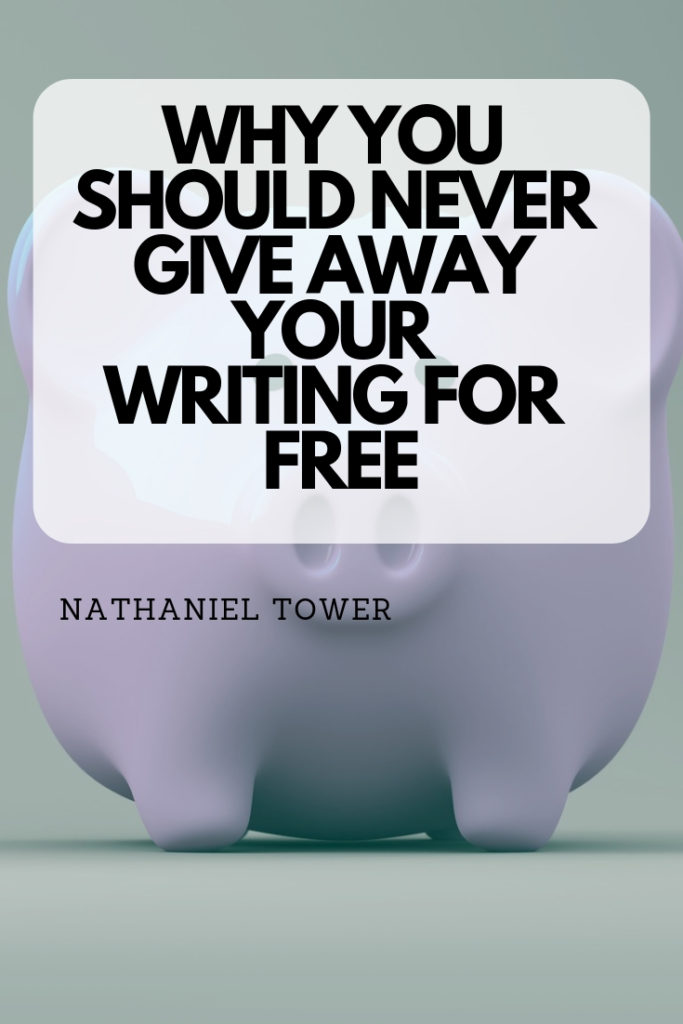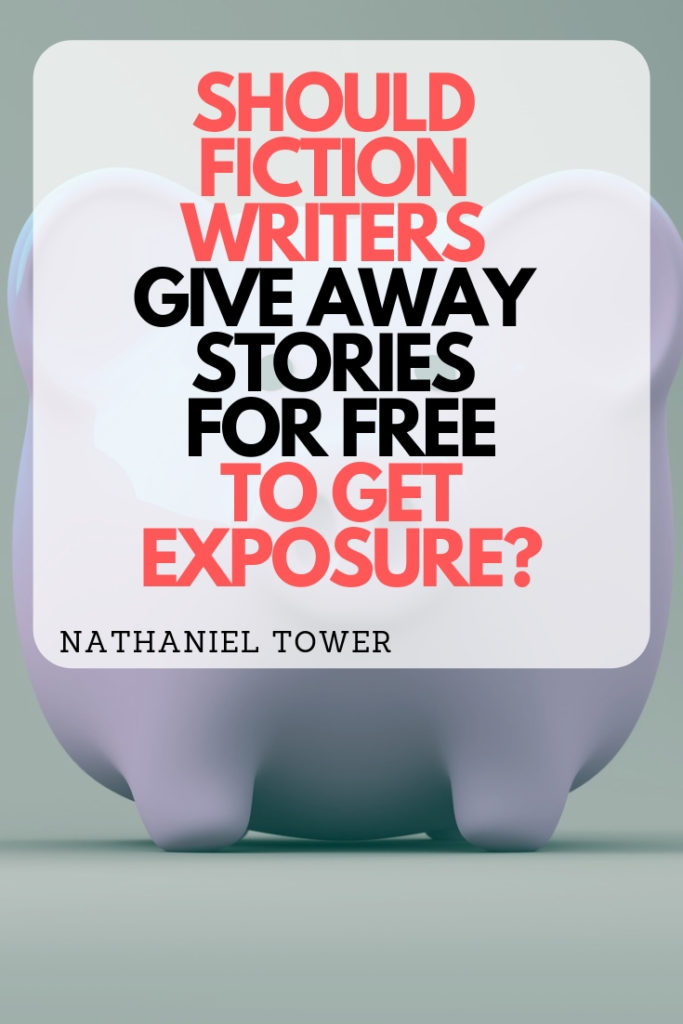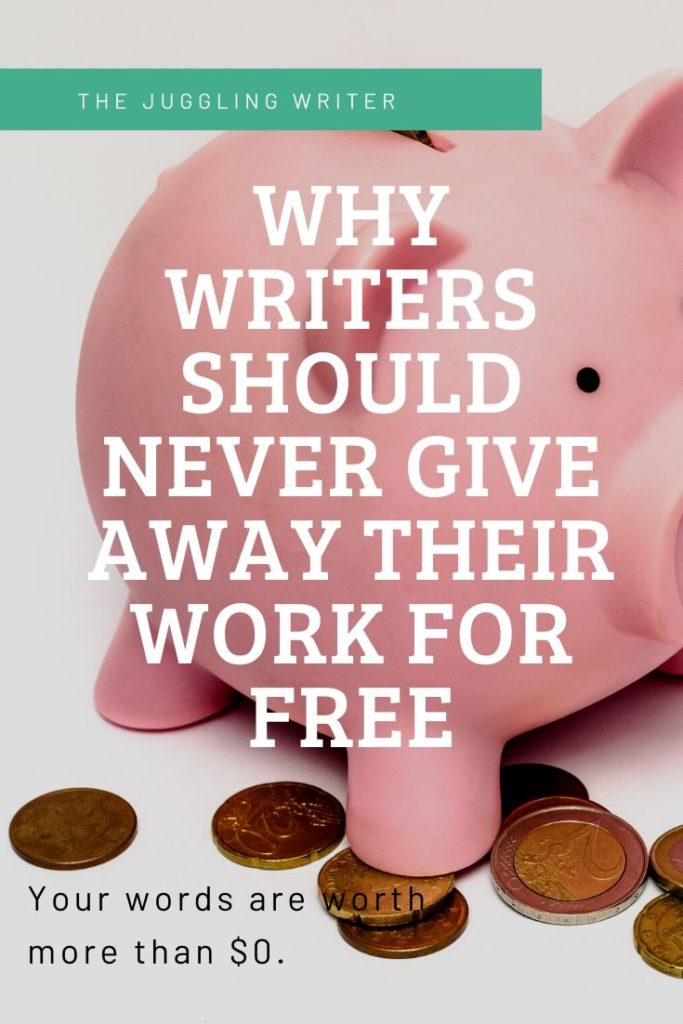Last Updated on May 25, 2020 by Nathaniel Tower
Fiction writers spend countless hours crafting a single story. I don’t need to go into the details about the painstaking process involved in perfecting a story down to each and every word. So what’s the payoff for all this effort?
When your story is finally “ready for publication,” there’s always the question of what exactly to do with it. It’s not simply a matter of getting it published. You need to figure out what your goals are for that story. Where do you want it published? Print or online? How much is that story worth to you? Or would you settle for giving it away for free and getting exposure?
Selling a story isn’t easy
The opportunities to make big money from writing short stories are few and far between. For every story sold to The New Yorker and Glimmer Train, there are thousands and thousands of published stories that will never make a dime. For every story receiving a token payment from a literary magazine with a small readership, there are millions and millions of stories that will never be published at all.
Although it’s difficult to get fair compensation for the many hours we spend on our fiction, it isn’t impossible. Personally, I’ve had around 50 paying acceptances, including several stories I sold for over $100. Most of my paying acceptances tend to be closer to the $10 range though. Still, it’s better than nothing, right?
But what about giving a story away for free to get exposure? Is this just a waste after spending so much time working on a story?
Click here for advice on how to sell a short story.
Why payment isn’t the only measurement of success
I don’t think many writers would choose exposure over a payment. However, exposure is sometimes worth more than money. Exposure could potentially lead to bigger success down the road. But it depends how much money we’re talking and how big that exposure is. After all I would rather have $100 than 10 people read my story for free. On the flip side, I would rather have thousands of readers than a $10 payment.
Let’s explore some possibilities that could happen when your work is published:
- High-paying market with big readership – This is ideal. Lots of money and lots of readers.
- Low-paying market with big readership – Also pretty darn good.
- Non-paying market with big readership – Not as good, but it’s nice to have your work noticed.
- High-paying market with small readership – I like money, but I also want people to read my story.
- Low-paying market with small readership – That kind of stinks, but at least I got something for my work.
- Non-paying market with small readership – That’s about as bad as it gets. In fact, this might be worse than not getting published at all.
Whenever we seek publication, we have to balance the payment and the readership. And we also have to consider what rights we’re giving away to get that readership.
Writers want money first
I’ve been on both sides of this issue. As a writer, I’ve always favored paying markets. But I also ran my own literary magazine that couldn’t afford to pay most of our writers.
When I first launched Bartleby Snopes Literary Magazine back in 2008, several writers sent scathing emails demanding I pay them for their words. While they were certainly entitled to the opinion that their words (and the subsequent time it took to create them) are worth money, the arrogance on display in their demands showed what little knowledge they have of the literary community–and the world of fiction as a whole.
Demanding pay for your fiction isn’t going to get you very far. I’ve heard stories from other lit mag editors of people demanding money after their stories were accepted. Why did these writers bother to submit at all when they had the knowledge ahead of time that no monetary exchange would take place?
For any writer, one of the toughest questions about the submission process is where to send the work. After spending hours on your story, you don’t want to ship it off to just anywhere. You deserve compensation, right?
Giving away your fiction for free
The idea of “giving your fiction away for free” might be offensive to some writers, but for many other writers, there is much more to it. And that’s why many writers submit their work to “exposure-only” markets.
But just how much “exposure” do these markets really give us. I have yet to have a single agent approach me and say, “I saw your story in The Rinky Dink Review last week. I know you probably didn’t get paid for it, but I would now like to offer you representation for your fiction. I think you’re going places, and The Rinky Dink Review is going to help you get there.”
If you are expecting an exposure-only market is going to open the door for you to be wined and dined by agents and big-time publishers, then you are probably a little misguided. However, that isn’t to say someone important won’t see and enjoy your fiction in one of these exposure magazines. Every writer starts somewhere, and very few writers start with a six-figure contract for their short story collection.
Some writers approach the submissions game like this:
Step 1: Send story to all professional-paying markets. Receive rejections. Realize I’m not a pro.
Step 2: Send story to all semi-pro markets. Receive rejections. Realize I’m not a semi-pro.
Step 3: Send story to all token markets. Receive rejections. Realize this story isn’t worth money at all.
Step 4: Send story to all well-known exposure markets. Receive rejections. Realize this story doesn’t deserve much exposure.
Step 5: Send story to anyone willing to publish it. Receive an acceptance. Rejoice.
Know what you’re getting into when you submit your work
Submitting your work doesn’t have to follow such a hierarchy, but you should know what you’re getting and how it lines up with your goals. If a market is offering you nothing more than a publication credit, then make sure you understand what exactly a publication credit means. For one thing, it means you don’t have first rights anymore, which severely limits where the story can be published later. Most exposure-only markets won’t even take previously published work.
Understand the value of a publication credit
It’s also important to understand the true value of a publication credit. Most big-time publishers couldn’t care less about the number of literary magazines that have published your work. I’ll use myself as an example. I’ve had my short stories published by over 200 literary magazines. I’ve yet to have a single big-time publisher ooh or aah at this achievement. But one story in The New Yorker, and you know what would happen.
Yes, exposure does open doors
Of course, that doesn’t mean all these exposure-only publications are a waste of time. Many of these publications did open doors for me. They exposed my name to more readers. They introduced me to great people in the writing community. They led to solicitations for other stories. They helped me get my first short story collection published–with an advance.
There’s no guarantee any acceptance will lead to any of the above. In fact, there’s no guarantee an acceptance will mean anyone in the world will read your story. However, if you submit to the right places, it’s safe to assume you will get at least some exposure. If the story is good enough, and you promote it enough, then you may get a lot more than you would have had you gone for that $5 acceptance.
These days, $5 gets you a month of Duotrope access. Having your story read by hundreds of people might be worth a lot more than that.
There’s nothing wrong with giving away a story for exposure. Just make sure you understand how much exposure you’ll get before you make the decision to give away your hard work.
Do you submit to venues that pay with exposure only? Share your thoughts in the comments. And don’t forget to share this post with all your writer friends!




For unknown authors, it makes for a sound business plan to offer a few titles, maybe shorter in length, for free. If a reader likes what he sees, he wouldn’t mind buying what you are selling. Putting titles to your name is important.
The editor of the Missouri Review once told me that with every issue they publish, he will get at least one agent calling about a piece and asking if the author has representation. Of course, I’ve never had anything accepted by the Missouri Review, and no agent has ever inquired about me based on my stories.
Thanks for sharing this, Paul. It gives us all hope, right?
After 28 years of writing short stories and having over 60 published in print and on-line journals I have earned very little money. The Big Name journals which pay big money have rejected me time and time again. Yet, these same stories were published in small unpaying literary journals. I don’t know if that means the editors of the small journals are less selective than the editors in the Big Name journals. If so, then all the stories I’ve had published are less than great, perhaps good, but not great. It certainly deflates one’s ego. However, I like to think that editors of small journals are decerning and educated and know a good story when they read it. I have no explanation as to why my stories haven’t made it into the Big Name Journals, but after all these years I just accept gladly the acceptances I receive.
Adelaide B. Shaw
Adelaide, thank you for commenting. First off, I think many of the small journals do print great stories. At Bartleby Snopes, we are very selective. We certainly don’t routinely accept stories that we think are less than great. It ultimately comes down to a matter of preference/aesthetic, as well as “getting your foot in the door.” Yes, as much as we hate to admit it, most of the big name journals don’t publish unsolicited submissions from “no-name” writers (even if they seem to encourage them).